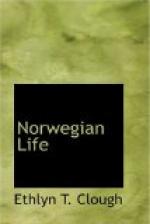The compulsory studies in the primary schools are the Bible, the catechism of the Lutheran creed, the Norwegian language, the usual elementary branches, with history (including a treatise on the constitution and the government of Norway), botany, physiology (including the fundamental principles of hygiene and the effects of the use of intoxicating liquors), singing, drawing, wood-carving, the use of the lathe and other tools, manual training, gymnastics, and rifle shooting.
The national law requires that schoolhouses shall be so located as to be within a distance of two miles of the residences of ninety per cent of the children of school age. The poor are provided with text-books upon application, and in some places the municipal council provides every child a warm dinner at noon. It can be paid for if the parents prefer, but the better classes look upon this provision with prejudice, as they do upon all charities. Nevertheless, it is an excellent idea to be sure that the children of the poor get at least one warm meal every day. In the city of Christiania, 711,302 meals are served annually in the primary schools. The average attendance is 22,750, so that only about 24 per cent of the children take advantage of the free dinner. Only 18,341 of these meals are paid for, and those are taken on stormy days by children of well-to-do parents.
The Norway school teachers must be graduates of normal schools, of which there are twelve in the kingdom; they must pass examinations and serve a probation of three months before they are definitely engaged, but when they have once received an appointment, they are settled for life and sure of a pension at the end of the long term of faithful service. The same rule applies to all civil service employees, for the school system is a part of the government. There is no such thing as rotation in office. Promotion is expected by all who deserve it. A worthy and efficient teacher, having begun in youth at the lowest grade, expects advancement to the highest, according to the judgment of the school boards and supervisors. School teaching is a career, just as a government clerkship is a career. People enter both professions with the expectation of making them their life-work, although from our point of view they offer very little inducement.
The average salary of the school teachers in Norway is only about $220 a year, the men receiving a little above the average and the women a little less. The highest salaries are paid in the city of Christiania—$756 for men and $434 for women. Head masters to the number of 1,992, like parsons, are furnished with houses to live in and little tracts of land, three or four acres, where they can raise vegetables for their families and keep cows; and nine hundred and ten of them add a little to their incomes by serving as parish clerks. When they become too old to teach, they receive pensions of from $56 to $224 a year, and when they die, their widows are remembered by the government to the extent of from $28 to $74 per year.




